English middle class fiction and poetry in present day Sri Lanka -
The Wadiya Writers Circle
By Wilfred Jayasuriya
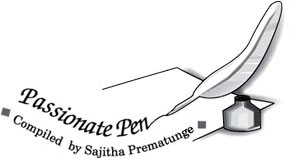 Presentation
at the International Conference of Commonwealth Literary Associations at
Vancouver, Canada, on the theme “Literature For Our Times.” August 18th,
2007 Presentation
at the International Conference of Commonwealth Literary Associations at
Vancouver, Canada, on the theme “Literature For Our Times.” August 18th,
2007
Abstract:
English literature in Ceylon developed under colonial rule and
reached its brightest efflorescence in the immediate aftermath. However
with nationalist cultural policies its growth was suppressed and
national language culture flowered. In the 1980s economic and political
changes, opening Sri Lanka up to the world, also fostered an English
revival.
These events have been documented by me in Sri Lanka’s Modern English
Literature-a Case Study in Literary Theory (Navrang, New Delhi 1994). In
the 1990s and post 2000 years novels, poetry, scholarly studies in the
social sciences and drama, newspapers and magazines, have dealt with Sri
Lankan themes in English in larger numbers.
|
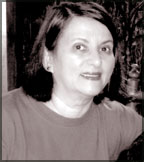
Anthea Senaratne |
An English speaking middle class has raised its head. It expresses
itself through informal groups such as old boys/girls, sing for joy,
learned societies, travel, religious and professional groups etc.
Since more than half a decade has passed since independence the
English speaking middle class has revived connections with English
language creativity, American as well as non-American, and makes bold to
express itself in traditional forms on themes which are insistently
national and local.
It is the English language that gives them an aspect of universality
but the metaphors would involve Pop Eye eating spinach with a vegetable
woman selling green leaves in the village fair.
In the context of the rather heavy seriousness of the presentations
made at this ACLALS international conference in Vancouver a somewhat
light hearted talk may be welcome.
|
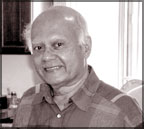
Wilfred Jayasurira |
Unlike professionals whose stock in trade is literature, studied in
academic contexts, and the various theories about how to interpret
literature, the writers whose work I wish to present are just amateurs
whose livelihood does not depend on their literary or academic
performance.
My difficulty however is to persuade a possible audience of
professionals to take interest in what I have to say. Will I bore the
serious by attempting casualness? On the other hand though I may try to
be casual the writers whose work I present are dead serious about what
they have written though their livelihood may not depend on it.
Let’s begin with a quote from “A Matter Of Taste,” a story about two
gentlemen cockroaches, Kikko and Pippa, going out for dinner. The scene
is Colombo, the capital of Sri Lanka.
“Where do you intend going Kiko?”
|
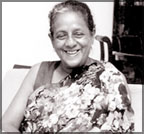
Punyakante Wijenaike |
“To our favourite joint down the road, of course.” “Why not? - I’m
delighted,” Pipa whispered. “Let’s go right away.” He wiped his feet on
a dirty rag on the shelf, spread his wings and headed for the floor.
They finally arrived at their destination, and entered through the rear
of the Kush-Kush Hotel.
“The door hasn’t even been shut today”, they both whispered to each
other - “how inviting!” They crawled into the kitchen as fast as their
feet would carry them.
Everything seemed quiet inside and the moon shed it’s light all over.
The unwashed plates and dishes were heaped unevenly in the sink. Below
this stood the bin, which brimmed with left-overs - meat, chicken and
fish, mixed with rice and vegetables - all smelt stale and sour. Pipa
gave a broad grin and shook his head.
“Oh Kiko, dear Kiko, you couldn’t have chosen a better place for us
to dine tonight. Isn’t this smell irresistible? It’s heavenly! just
heavenly!” he said, as he shut his eyes and breathed in the aroma.
“Aren’t we lucky that the waiters have gone off to sleep today without
cleaning up?”
In this allegorical tale, Beatrice Balaratnarajah, the lady author,
has managed to be light hearted and serious at the same time. The two
cockroaches, enjoying their dinner in the garbage bin, narrowly escape
internment when the garbage van takes away their favourite eating joint,
the garbage bin.
Through the comedy of the cockroaches Beatrice Balaratnarajah is able
to talk about the bitter sweet life of the Colombo dweller, whose
existence appears often as precarious as that of cockroaches, dominated
as Colombo is by the tension and incomprehensible causes and effects of
the environment of war.
The writers’ group I speak of called the WADIYA Group meets regularly
at a beach hut in Colombo and read their stories and poems to each other
with the sound and colour of the sea beside them, and the occasional
roar and thump of the passing coast line train to give a pause to the
reading.
Every year they have put out a magazine titled WAVES , which presents
selected writings of that year. This amorphous group has lasted almost a
decade. To some extent it represents a spontaneous desire to protect and
foster values associated in ex-colonies with the English language.
I leave the listener to make up his or her own mind about the
literary value of these writings and proceed with my presentation of
samples of their work. In her collection of short stories titled
“Dancing With The Dogs” Anthea Senaratne shows the brighter side of
life, by resolving conflicts in a light hearted fashion, laughing them
off.
The comic or satiric depends largely on class attitudes. Each class
likes to laugh at the other. One must be secure in one’s own station in
life to find life funny.
The story “The Lesson” is about money and class, and about how to
live. Gihan and Kolitha are two Sri Lankan computer people working in
USA. Gihan enjoys spending and Kolitha is a miser. They are both
successful at work and Kolitha has brought a wife over from Sri Lanka.
Gihan tells the story.
“Managed to get a good catch from Sri Lanka machang.” He nudged my
elbow and rolled his eyes, “good dowry and house and money here and
there also.” He squeezed my arm making me squirm...Leesha was small made
and had dark twinkling eyes and a smile that lit up her delicate elfin
features.
How the hell did he get such a good catch?... Maybe he had changed
his miserly ways. But in spite of his good fortune and professional
ability Kolitha remained a miser. Gihan feels sorry for Kolitha’s wife,
Leesha, and invites them to a sumptuous meal at a trendy restaurant,
where Kolitha declines to eat everything except the cheapest items on
the menu while Gihan and Leesha enjoy the best and the most expensive.
Finally when the bill comes Gihan’s Visa card turns out to be
unacceptable and Kolitha is left to pay a huge bill while Gihan makes
good his escape from the scene. [Kolitha] was examining the bill as the
waiter leaned over his shoulder. Leesha placed her elbows on the table
and cupped her face in her hands.
“So lovely to meet you Gihan,” she held my hand briefly, squeezing it
ever so gently. “Do keep in touch-hope we see you again soon.” Her eyes
had an unmistakable twinkle in them as she spoke. (Dancing With The Dogs
2002 p 111)
Like the gentlemen cockroaches, in Colombo, depicted in “A Matter Of
Taste” these Sri Lankans, in a foreign land, settle matters somewhat
amicably at a restaurant. Anthea Senaratne’s skill as a story teller
lies in her simple descriptive style, depending on vivid, illustrative
gestures by her characters and identifying speech to bring life to every
scene.
The story is beautifully structured and ended. The WADIYA group sees
her as representative of its achievement. A non-Sri Lankan audience may
however miss quite a lot of the fun, since it depends on an
understanding of non middle class Sri Lankan viewpoint represented by
Kolitha. Sisila Cooray is a lady poet. She writes about private
emotions. In her poem “Silent Sounds” she speaks of spiritual loneliness
and the arrival of Christ into one’s being.
The knocking on her door
Was steady and insistent
She felt impelled
To unbar-to unlock...
Light streaked in
Through half inch of open door
And cut the thick darkness of her room.
“Let Me come in.” He said, “I am Light,
And you shall sit in darkness no more.”
(Waves 1997 p 15)
In a multi-religious society like Sri Lanka the WADIYA Group provides
an opportunity to expose one’s intense personal feelings to others who
may not share one’s beliefs. This by itself is a sufficient reason for
its existence. The English language is a neutral vehicle to convey a
somewhat distanced religious emotion among Buddhists, Hindus, Muslims
and Christians.
Vivimarie Vanderpoorten’s poem like Sisila Cooray’s expresses a
religious desire for enlightenment and peace of mind.
Haiku: Protesting Faith, September 2006
New custodians
In this temple of the Tooth
Soldiers wielding guns...
Alms need to be scanned
For bombs by a computer Trays of flowers searched...
Public body check
Before going inside
To purify the mind
(Nothing Prepares You 27)
Faith Ratnayake’s short story “The Two Edged Sword” is about a female
office executive, Seelawathie, who has a very attractive exterior but
whose heart is rotten to the core.
Traditional middle class values of honesty and truthfulness come to
the fore in passages of description, which are reinforced by a moral
judgement.
“Seelawathie walked in state up the main staircase, after signing the
book downstairs. Her bright orange Kandyan style sari and her thick gold
chain and bangles dazzled the eyes.
She was plump and fair, with thick black hair wound up in a konde
that bobbed loosely at the back of her neck. Her main feature was the
two deep dimples that adorned her cheeks, and together with her smile
and flashing white teeth, she had the look of an outsize cherub.
Truly she considered herself to be an Angel, not a Guardian Angle but
a Recording Angel, who kept the record straight by always telling the
truth. At least about other people.”
Seelawathie’s exploits include poisoning the mind of her bosses’ wife
by passing on innocent information from his office diary as if it
implied guilt. She keeps the entire office on pins because of her hidden
power.
“Sweeping into the outer office, she arranged her bag and lunch
packet on the side table, and rang the proud brass bell on the desk.
Siyanoris, the peon, ran in with the cup of tea that he must make
specially for her every morning. He sped the hundred yards dash without
spilling a drop, and breathed again freely, until Seelawathie thundered,
“Too hot you fool. Get me boss’ diary.”
But suddenly Seelawathie dies. She meets the devil, a very fair,
handsome man with a healthy blush of pink on his cheeks. He greets her
warmly. He smiled a knowing smile, his white teeth gleaming...Suddenly
in great embarrassment Seelawathie realized she was naked. It was
useless to try and hide. She was completely open now for all to see.
“I am extremely pleased that you have been doing my work on earth.
You proved my point that there are lies, statistics and damned lies and
those with the gift to spread them.” His smile dazzled her and
Seelawathie soundly surprised, did not know whether to smile and flash
her dimples, or just keep quiet. For once, as long as she could
remember, she was at a loss for words.”
The Sinhala name “Seelawathie,” which denotes a rural or non-Anglisised
origin, immediately alerts the reader to the possibility that she is an
upstart in a power structure which is derived from colonialism. Faith
Ratnayake combines humour and irony with fantasy and moral evaluation in
a nice bit of class based story telling.
In Punyakanthie Wijenaike’s recent prize winning short story the
speaker is a teenager whose mother has gone to the Middle East, from Sri
Lanka, to work as a housemaid.
The husband abandoned by his wife impregnates his teenage daughter.
The skill of the story teller lies in the gradual unfolding of the
shameful reality, presented through the daughter’s monologue.
While the theme of the horrors of broken families, through employment
as housemaids abroad, is ever present in Sri Lankan minds, focusing on
the emotional torment is not accompanied by comment on the State and
society’s failures-such as division among the major communities-which
force people to work abroad. Instead the Central Bank reports that the
largest foreign exchange earners, topping both tea and garment exports,
are these very housemaids.
Wilfred Jayasuriya has been a Sri Lanka government executive who had
worked in many jobs as an administrator. His stories about work among
the villagers also draw on accounts of work done by British public
officers (Government Agents) recorded in work related diaries.
In a forthcoming novel titled “The Joys Of Our Youth” he includes a
story called “Elephant Drive” where he tries a dialogic mode, telling
the story of how his hero took the risk of driving elephants, when he
worked in a large agricultural project, to his grandson Dino and
granddaughter Emily, in California, who have been demanding a “real”
story from him.
So I worked in rice farming.... we had to give lots of water to grow
the rice. We make canals to take the water to the paddy.” “Canals are
like aqueducts Grandpa?” “Ah! You are a clever guy Dino! Like trains
going along viaducts in your train set. But there were lots of elephants
in the jungle nearby to eat the paddy.
The farmers were very angry. They told me to come and chase the
elephants..” “So? What?” Dino’s eyes were becoming quite big and focused
on Jayantha’s face. Emily snuggled close to him.
“I told them to go and chase the elephants themselves!” “Ha! Ha! Very
good Grandpa” Emily clapped her little hands vigorously and Dino
wriggled with excitement. “So did they?” “They did. And one of the
farmers was killed by an elephant.” Jayantha looked at their faces. They
didn’t quite know what to make of that. Had he gone beyond their
understanding? Did they know what death was?
Jagath Kumarasingha and Asgar Hussein are scriptwriters in the
advertising trade. The advertising companies coach their personnel in
standard composition practices like clustering, brain storming and other
inventive methods. They provide services not only in English but also in
Sinhala and Tamil, the native languages. These different language
applications on the same subject must be cross fertilizing each other.
Jagath was a Sinhala advertising script writer and Asgar is an
English language advertiser. Jagath, who is also a prize winner claims
that he adopts the cluster method as opposed to the linear or logical
method, in composing his narratives. Lets look at one of his paragraphs
for evidence.
This is the opening paragraph of “Pop Eye Is A Yankee.” which is a
story in Jagath’s book of short stories titled Kider Chetty Street.
“Beef never becomes bulls. The bulls become beef. Would you knife Baba
in the way you knife that calf for the most tender cut of beef? Baba who
loves Pop Eye while Pop Eye loves spinach.
Because Pop Eye depends on spinach like those bulls depend on greens
and grass. Spinach is an expensive item among the greens that Baba’s
grandmom sells. Her greens are various. Take gotukola. Those leaves are
as round as little cart wheels. This is how Baba feels. And the other
greens like mukunuwenna - those leaves are long and look like spikes.
Moreover the drumstick leaves - by nature they are laxative. Those
leaves have the ability to purge you, as Grandmom says, like the
Mahaveli river inundates. The drumstick leaves can purge you in
tremendous bubbling yellow.” (Kider Chetty Street 2005 p 85)
The thought process is circular moving by association of ideas. It
derives its vitality from the unexpected items that emerge with each
sentence or part of a sentence.
The Sinhala words are not given English translations. Instead they
are explained by comparisons with known things like cart wheels and
spikes and “tremendous bubbling yellow(!).” One could presume that the
advertiser’s art is in use. The audience is addressed directly: “Would
you knife Baba...?” Now lets look at a verse paragraph of Asgar
Hussein’s poem “Yalpannam.”
“Jaffna” is personified as a woman and speaks in epic verse mode. She
speaks of the endless suffering she has to endure. The theme of time is
implicit.
Unroll the past
And try to understand
I am more than a battle ground
For myths, for tongues,
For genes fighting to extend
Their jurisdictions
More than a vessel holding
The dreams of old kingdoms
The deliriums of glories past....
And yet how many ordeals
Must I suffer to realize myself?
See the burns, the blisters on my skin
The explosions of fratricide,
Mines waiting to blow open new wounds,
The gangrenous spread
That has invaded my soul;
See the truth shrivel in my sand dunes
Exiled by lagoons of hate
The skill of the poet lies in combining the theme of history with
metaphors derived from the geography of the Jaffna peninsula. If one has
visited Jaffna one realizes how the last two lines “See the truth
shrivel in my sand dunes Exiled by lagoons of hate” infuse emotion into
a physical feature: the lagoons and sand dunes, that are characteristic
of the Jaffna landscape.
Jaffna as the homeland of the Sri Lankan Tamils for centuries, has
created a singular civilization which is said to be different from the
civilization found in the main Tamil land of Tamilnadu. It is this
special identity that Asgar Hussein tries to define in his poem.
But Jaffna is real and not a mere personification. In a novel written
by an expatriate Jaffna Tamil academic, titled “Lost In Transit,” the
last chapter of which was presented at the WADIYA, the middle class
hero, Kumaran, who has found a life for himself in USA, returns to his
parental home in Jaffna and faces a crisis of conscience.
“His father, after having given Kumaran his freedom to make up his
own mind about so many matters in his life had found in the end that he
could not reconcile himself to Kumaran living abroad, marrying outside
the community and not participating in the life of the country.
“So, you don’t have any feelings for the life of our people?” he
would say, and Kumaran would reply, “I don’t know who my people are. Why
should I think that the people of Jaffna are my people anymore than the
people of New York?” “I don’t understand that or you. What does that
mean? The people here speak your language, practice your religion and
are kind to you,” his father said.
“No, Appah,” Kumaran said, “I don’t speak their language — at least,
not very well. I have no religion. We are all strangers here, as well as
there.” “There you are again, going philosophical. It is fashionable,
but it’s still nonsense,” his father said.
“Why nonsense?” Kumaran asked.
“We are strangers, but some are less strange to each other than
others and that is all we can expect,” his father responded.
“Okay, Okay,” Kumaran said. “I don’t think we can resolve this. It is
too late for me, anyway. I have a career, a wife, a son and a home in
New York and there is no returning.” “Yes, yes,” his father said
bitterly. “You were not here for your mother’s funeral and you will not
be here for my funeral either.” Kumaran fell silent at this. It was
clear to both his father and himself that Kumaran would not be able to
come back to Jaffna in time to perform the last rites if his father died
while he was in New York.
“I come regularly to see you. I would rather see you alive...”
Kumaran had said as he walked away.”
Since the title refers to “English middle class writing” what is
specifically middle class in all this? The short answer is that if you
write or speak in English in Sri Lanka you are middle class. However
that is not the answer you expect.
My conclusion is that the kinds of attitudes that English speaking
middle class people have to certain areas of life activity are not in
any way definable as monolithic.
They are highly varied and though their writers can be identified
economically as comparatively well to do, the divisions in Sri Lankan
society make possible a multiplicity of views. To some extent the WADIYA
Writers’ Circle represents that multiplicity.
Distinctly American William Carlos Williams
 William Carlos Williams was born on September 17, 1883 in Rutherford,
New Jersey. He knew from an early age that he wanted to write, making
the decision in high school to pursue a career as doctor and writer.
Williams studied medicine at the University of Pennsylvania. William Carlos Williams was born on September 17, 1883 in Rutherford,
New Jersey. He knew from an early age that he wanted to write, making
the decision in high school to pursue a career as doctor and writer.
Williams studied medicine at the University of Pennsylvania.
He was a major poet of the Imagist Movement but later abandoned the
movement due to the values set forth by the other poets involved in it.
Williams married Florence Herman in 1912.They moved into a house in
Rutherford which was their home for many years.
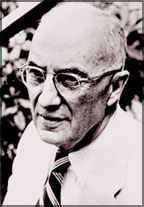
Shortly afterwards, his first book of serious poems, The Tempers ,
was published. Although his primary occupation was as a doctor, Williams
had a fully blown literary career.
A poet who had an immense influence on 20th century poetry, Williams
wrote in varying style and technique and was often radically
experimental.
His work is fresh and clear, rejecting sentimentality and vagueness.
Although Williams wrote a significant amount of prose, his poetry is his
marking point.
He experimented with many different styles, including terza rima and
free verse. Stylistically, Williams preferred the line over the
sentence. Williams was also influenced by many “-isms,” two of which
effected him greatly are Dadaism and cubism.
His work consists of short stories, poems, plays, novels, critical
essays, an autobiography, translations and correspondence. Williams’
most anthologized poem is The Red Wheelbarrow, considered an example of
the Imagist Movement’s style and principles. He was a major writer in
the modernist movement, helping to create a clear American style. He
didn’t use traditional meter in most of his poems.
He saw his poetic project as a distinctly American one; he sought to
renew language through the fresh, raw idiom that grew out of America’s
cultural and social heterogeneity, at the same time freeing it from what
he saw as the worn-out language of British and European culture.
Williams tried to invent an entirely fresh form, an American form of
poetry whose subject matter was centered on everyday circumstances of
life and the lives of common people.
He then came up with the concept of the variable foot evolved from
years of visual and auditory sampling of his world from the first person
perspective as a part of the day in his life as a physician. The
variable foot is rooted within the multi-faceted American idiom.
This discovery was a part of his keen observation of how radio and
newspaper influenced peoples’ communication and represents the “machine
made out of words” (as he described in a poem in the introduction to his
book, The Wedge ) just as the mechanistic motions of a city can become a
consciousness.
Williams had a heart attack in 1948 which was followed by a series of
strokes, forcing him to retire from his medical practice.
He continued to write until his death on March 4th, 1963. Williams
was a highly acclaimed writer, two of his many honours include the
National Book Award in 1950 and the Pulitzer Prize in 1963.
Compiled by Ishara Mudugamuwa
[email protected]
A narrow escape
by B. J. Perera
 The
School had just closed for the Christmas vacation and all the students
were in a boisterous mood. I was walking with my gang along the railway
line to the Kalutara railway station. Near the station was the railway
goods shed. Workmen were busy loading a huge petrol tank onto a trailer. The
School had just closed for the Christmas vacation and all the students
were in a boisterous mood. I was walking with my gang along the railway
line to the Kalutara railway station. Near the station was the railway
goods shed. Workmen were busy loading a huge petrol tank onto a trailer.
This was during the height of the Second World War and a Japanese
invasion was considered imminent. The empty tank was being transported
to Matugama to store petrol, in case the Japanese cut off supplies.
On the spur of the moment I picked up a stone and threw it high into
the air so that it would fall on the tank and give the workers a good
fright.
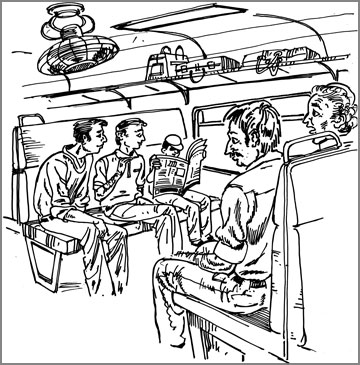
It never occurred to me that the stone could fall on one of the
workmen, and that was just what happened. Fortunately the stone missed
his head and struck the back of the hand disabling him for the day.
With some very obscene words which were not very complimentary to our
parentage the workmen pursued us, for, we had already started running.
Fear lent us wings. As I ran a text book slipped off my hands but I
dared not stop to pick it up. Fortunately the train had already arrived.
This was one of the three diesel trains sent to Ceylon as coal was
had to shipped all the way from England. The trains were very fast and
came to the Kalutara South station ten to fifteen minutes before the
scheduled time. So the workmen had enough time to search the three
compartments the train consisted of.
In the compartment I got into there was one empty seat and in the
adjoining seat was a friend of mine who had my name and my surname,
Joseph Perera.
He too was from Maggona. I quickly related to him what happened and
that the workmen were searching the train for me. He took in the
situation at once.
Taking off his hat he put it on my head and gave me a pair of highly
tinted glasses. Then giving me the evening newspaper said, “Read this
with your head bent as low as possible”.
Three workmen entered the compartment. My heart beat a pit-a-pat as
one of them asked a boy at the entrance who Joseph Perera was. They had
got my name from the book I had dropped during my flight to the station.
The workers approached me menacingly and asked me “Are you Joseph
Perera” before I could answer my friend said that he was Joseph Perera.
They showed him my book which I had dropped and asked if it was his. He
replied that it had been his and that he had sold it to a second hand
book shop.
All this while one workman was staring hard at me. I was sure that I
had been recognised and retribution would soon follow. My knees knocked
against each other uncontrollably as if they were afflicted by the
Parkinson’s disease.
My friend turned to the man who was gazing at me and tapped his own
head with his finger to indicate that I had a screw loose. The men
smiled and went away. My friend told me”Man, you are holding the paper
upside down.
My relief however was short lived. The workers smelt something fishy
in the whole episode.
The look of terror on my face did not escape them and school boys did
not wear hats and sun glasses. Back they came to me and demanded to see
my exercise books. This I did nonchalantly for none of my books
contained my real name.
The name there on was Yusoof. Our history teacher had told us that
the Christians and Muslims shared many personal names. For example
Joseph, David, Solomon, Alexander and John of the Christians were among
the Muslims Yusoof, Davood, Suleimen, Iskander and Yohana respectively.
Being more than slightly eccentric I adopted the Muslim name Yusoof.
The teachers welcomed this step as there were three Josephs in the
class. They asked me if I was a Muslim. I said my father was. They
accepted the fact that I was not Joseph Perera and quickly went away as
the train had begun to move. |
